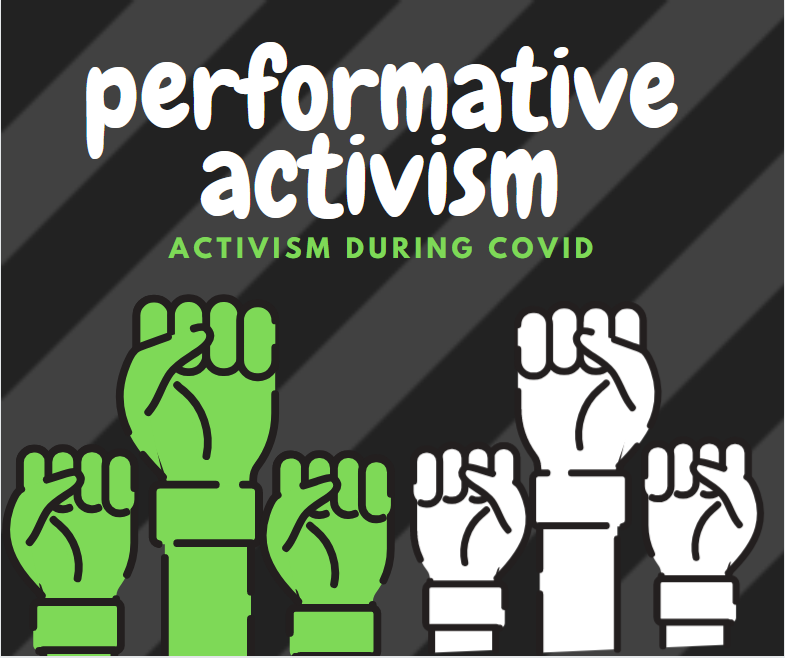Performative Activism and How to be an Actual Activist during COVID-19
Due to the rise of social media, we have seen the rise of performative activism and people putting up an act for likes and clicks. There are several ways we can combat this and be better activists.
Oct 8, 2020
With the rise of COVID-19 cases and the usage of social media, especially during quarantine, the majority of people get their news and information by simply clicking through posts. The year of 2020 is one like none other, from an ongoing pandemic to the rise of social injustice throughout the United States. Thus, as more and more people became aware of the severity of these current issues brought about the rise of performative activism, or slavitivsm. In TikTok bios, profile pictures, Twitter hashtags, and Instagram bios, some people only mention important topics like police brutality simply because it is cool and trendy, rather than actually caring. The truth of the matter is that a Hello Kitty “ACAB” profile picture and a “Blackout Tuesday” will do nothing for the movement. Buried behind all those black posts was valuable information that could have been used to make a difference. Performative activism is an imminent problem, so let us combat it by being better activists during a time when protesting or rallying may not be the best option.
So what is the big deal anyway? Acts of performative activism are no better than staying silent because, in the end, they both achieve the exact same thing: nothing. Words lose their meaning when there is no action to back them up. It could also become a negative factor. For example, “arrest the killers of Breonna Taylor” was overused so many times without being backed up that it became more of a catchphrase and a meme. Celebrities and their “tag 10 people that will support the Back Lives Matter movement” story chain made it seem like a joke for the upper classes.
This does not help the movement, it hurts it. Movements pertain to people’s lives and things changing for the better good; people are dying and all some people do is just post “cute and aesthetic” pictures about BLM- no links or no information. Yes, the pandemic has made it extremely difficult to go out into the street and protest but there are other ways to bring awareness to a topic and to stand behind a cause or a movement, ultimately combating slacktivism and setting us on the path for real change.
First off, inform yourself. Do research – nothing is worse than spreading false information about a topic. While your BIPOC friends can offer insight and personal experience in certain cases, do not only resort to using them as your news source. There are plenty of resources out there, you just need to be willing to put in the effort. The age of modern technology makes ignorance a choice; staying informed about your community is your duty. One simple and easy way to bring mindfulness to a topic is to bring it up in your personal life. Say, for example, a family member, friend or peer says something that may not be totally true- correct them. Speak on it, have quotidian conversations and note the facts about the particular topic. We do not need to wait for a headline to vocalize on an issue.
Additionally, if you are passionate about policy, consider volunteering! Things like working the polls, phone banking or potentially getting involved with activism-based organizations. The work one does now will end up helping a candidate who aligns most with your views significantly. Phone banking and text banking involve volunteering for your preferred candidate and reaching out to potential voters and ensuring they have a plan to vote. Ultimately, this allows for the candidate’s stances to be advocated for especially to undecided voters. Regardless if you get one or ten people to vote, it will be worth it. Along with this, if your goal is to get your government to do something, you should call them, petition and write emails. Policy-making can be affected by your voice! Another good idea is writing letters to newspapers to spread the word on certain issues, thus forming connections with like-minded people.
If possible, supporting businesses that work for the cause instead of against it because the truth is large companies hold a monopoly on a lot of goods that small businesses try to sell. For example, if you are against worker exploitation and the exploitation of children, consider buying something homemade rather than something commercial. Extra bonus points if you buy from sustainable POC-owned businesses. During the pandemic, POC-owned businesses were twice more likely to fail than other businesses. It is imperative that we put in our part and dedicate some time and effort into supporting the movement and acquainting ourselves with others that do too.
Unfortunately, the pandemic prevents some of us from going out and protesting; that is totally okay. That is for the best.
“People should respect the guidelines that were in place to control the virus and social distance to this day,” freshman Rosibel Garcia said.
Another way is to use your social media platform for the better. Social media is the biggest perpetrator of this performative activism because it is so centered around likes, views and shares; but it can also be a great method to reach people who are otherwise oblivious to such an important topic. There are plenty of posts and accounts dedicated to making infographics about certain topics–you could always boost those accounts, share them on your story perhaps. If you’re worried it might ruin your “feed,” it won’t. Sharing petitions and places to donate is also a good way to acknowledge important topics.
Now, more than ever, we cannot allow things to stay the same, 2020 has shown us that there are a lot of things wrong with how things are managed right now, and we must fix it. If we want this world to get any better and cause legitimate change, we have to put in the work. You cannot reap what you have not sowed. So rather than simply bringing up a topic when it’s convenient, let’s have legitimate conversations and bring awareness to matters that are truly important.












